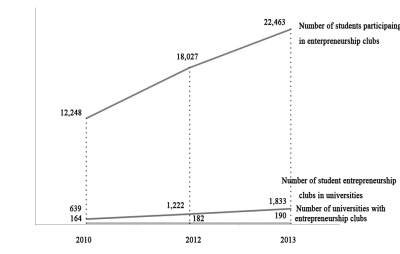22,463 students engaging in one of 1,833 student entrepreneurship clubs in university

According to a survey of 423 universities conducted by Small and Medium Business Administration and Korea Institute Startup & Entrepreneurship Development, the number of student entrepreneurship clubs increased by 50 percent compared to last year, amounting to 1,833 this year from 1,222 in 2012. Until last year, 182 universities had entrepreneurship clubs but as of now, the number has reached 190. The number of students involved in an entrepreneurship club has also gone uphill, showing a 24.6 percent increase. A total of 22,463 students are reported to be engaged in entrepreneurship clubs in contrast to last year’s 18,027 students.
Regarding the entrepreneurship clubs’ field, the information and communication field accounted for the biggest proportion with 31.2 percent, followed by the electronic field with 13.3 percent, machinery and materials with 10.8 percent, and crafts and design with 10 percent.
With student entrepreneurship clubs expanding rapidly, the number of university students who actually go on to start their own business is also rising. In 2012, a total of 407 students ventured into setting up their own business whereas 211 students launched their enterprises in 2011.
Some entrepreneurship clubs have successfully set up their own business. ENACTUS, the student entrepreneurship club at Hankuk University of Foreign Studies, started its own business called “STORYBEANS” in June 2012. STORYBEANS sells coffee products online and part of its profits goes to support the homeless. Since then, STORYBEANS has been making a profit of one million won every month.
“The rise in startup business will allow one to work independently on a field he or she is interested in. It also seems to be a way to alleviate the unemployment crisis we face today,” the representative of STORYBEANS said. “I want to emphasize that adequate preparation such as organizing a business plan before launching a business is essential.”
In the midst of this startup trend, universities are also supporting student entrepreneurship in various ways. Yonsei University promotes student entrepreneurship on campus through Yonsei Enterprise Support Foundation (YESF). YESF supports aspiring entrepreneurs through three steps: the startup foundation building step, business planning & commercialization step and prep entrepreneur step. In the startup foundation building step, YESF offers students opportunities to listen to lectures and participate in startup clubs and contests to garner entrepreneurial mind. Then, students can explore their business ideas and commercialize business plans in business planning & commercialization step. In the last stage, YESF provides an office on campus for those whose submitted business plans and ideas are selected. The selected ones can stay for two and a half years maximum with business, equipment and facility support from the school.
As for Ewha, Ewha Industry Collaboration Foundation (EICF) has been running the Ewha Start-up Academy as it was selected as the 2013 General Startup Academy Operating University, which is financially supported by SMBA. In addition, EICF offers the Ewha Campus CEO course, in which students can learn how to plan their business and make marketing plans through theory and example learning and actual practice.
EICF has been also collaborating with other universities that operate similar courses such as Korea University and Seoul National University.
“Besides the Ewha Campus CEO course and Ewha Start-up Academy, we also provide special lectures on a regular basis to boost student entrepreneurship and have been co-hosting the Ewha Festival for Business Plan with the Business School,” said Kim Su-jeen, an official of EICF. “Rather than limiting itself to the domestic market, EICF is also planning to organize diverse programs for students to participate in overseas startup camps and explore global startup enterprises.”
Lee Sang-ha
banilab5748@ewhain.net

